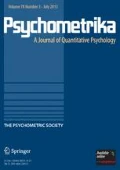Abstract
As pointed out by Sijtsma (in press), coefficient alpha is inappropriate as a single summary of the internal consistency of a composite score. Better estimators of internal consistency are available. In addition to those mentioned by Sijtsma, an old dimension-free coefficient and structural equation model based coefficients are proposed to improve the routine reporting of psychometric internal consistency. The various ways to measure internal consistency are also shown to be appropriate to binary and polytomous items.
Similar content being viewed by others
References
Bentler, P. M. (1964). Generalized classical test theory error variance. American Psychologist, 19, 548.
Bentler, P. M. (1968). Alpha-maximized factor analysis (Alphamax): Its relation to alpha and canonical factor analysis. Psychometrika, 33, 335–345.
Bentler, P. M. (1972). A lower-bound method for the dimension-free measurement of internal consistency. Social Science Research, 1, 343–357.
Bentler, P. M. (2003, July). Should coefficient alpha be replaced by model-based reliability coefficients? Invited paper presented at International Meetings of the Psychometric Society, Cagliari, IT.
Bentler, P. M. (2007). Covariance structure models for maximal reliability of unit-weighted composites. In S.-Y. Lee (Ed.), Handbook of latent variable and related models (pp. 1–19). Amsterdam: North-Holland.
Bentler, P. M. (in press). EQS 6 structural equations program manual. Encino: Multivariate Software. www.mvsoft.com.
Bentler, P. M., & Kano, Y. (1990). On the equivalence of factors and components. Multivariate Behavioral Research, 25, 67–74.
Bentler, P. M., & Woodward, J. A. (1980). Inequalities among lower bounds to reliability: With applications to test construction and factor analysis. Psychometrika, 45, 249–267.
Bollen, K. A. (1980). Issues in the comparative measurement of political democracy. American Sociological Review, 45, 370–390.
della Riccia, G., & Shapiro, A. (1982). Minimum rank and minimum trace of covariance matrices. Psychometrika, 47, 443–448.
Heise, D. R., & Bohrnstedt, G. W. (1970). Validity, invalidity, and reliability. In E. F. Borgatta (Ed.), Sociological methodology 1970 (pp. 104–129). San Francisco: Jossey-Bass.
Jöreskog, K. G. (1971). Statistical analysis of sets of congeneric tests. Psychometrika, 36, 109–133.
Kano, Y., & Azuma, Y. (2003). Use of SEM programs to precisely measure scale reliability. In H. Yanai, A. Okada, K. Shigemasu, & Y. Kano (Eds.), New developments in psychometrics (pp. 141–148). Tokyo: Springer.
Lee, S.-Y., Poon, W.-Y., & Bentler, P. M. (1995). A two-stage estimation of structural equation models with continuous and polytomous variables. British Journal of Mathematical and Statistical Psychology, 48, 339–358.
Li, L., & Bentler, P. M. (2004). The greatest lower bound to reliability: Corrected and resampling estimators. Paper presented at Symposium on Recent Developments in Latent Variables Modeling. Tokyo: Japanese Statistical Association and Japanese Behaviormetric Society.
McDonald, R. P. (1985). Factor analysis and related methods. Hillsdale: Erlbaum.
McDonald, R. P. (1999). Test theory: A unified treatment. Mahwah: Erlbaum.
Muthén, B. (1984). A general structural equation model with dichotomous, ordered categorical, and continuous latent variable indicators. Psychometrika, 49, 115–132.
Raykov, T. (2001). Bias of coefficient α for fixed congeneric measures with correlated errors. Applied Psychological Measurement, 25, 69–76.
Shapiro, A. (1982). Rank reducibility of a symmetric matrix and sampling theory of minimum trace factor analysis. Psychometrika, 47, 187–199.
Shapiro, A., & ten Berge, J. M. F. (2000). The asymptotic bias of minimum trace factor analysis, with applications to the greatest lower bound to reliability. Psychometrika, 65, 413–425.
Sijtsma, K. (in press). On the use, the misuse, and the very limited usefulness of Cronbach’s alpha. Psychometrika. doi:10.1007/s11336-008-9101-0.
ten Berge, J. M. F., & Sočan, G. (2004). The greatest lower bound to the reliability of a test and the hypothesis of unidimensionality. Psychometrika, 69, 613–625.
ten Berge, J. M. F., Snijders, T. A. B., & Zegers, F. E. (1981). Computational aspects of the greatest lower bound to reliability and constrained minimum trace factor analysis. Psychometrika, 46, 201–213.
Woodhouse, B., & Jackson, P. H. (1977). Lower bounds for the reliability of a test composed of nonhomogeneous items II: A search procedure to locate the greatest lower bound. Psychometrika, 42, 579–591.
Woodward, J. A., & Bentler, P. M. (1978). A statistical lower-bound to population reliability. Psychological Bulletin, 85, 1323–1326.
Zinbarg, R. E., Revelle, W., Yovel, I., & Li, W. (2005). Cronbach’s α, Revelle’s β, and McDonald’s ω H : Their relations with each other and two alternate conceptualizations of reliability. Psychometrika, 70, 1–11.
Author information
Authors and Affiliations
Corresponding author
Additional information
Research supported in part by grants DA00017 and DA01070 from the National Institute on Drug Abuse. This paper is based in part on Bentler (2003).
Rights and permissions
About this article
Cite this article
Bentler, P.M. Alpha, Dimension-Free, and Model-Based Internal Consistency Reliability. Psychometrika 74, 137–143 (2009). https://doi.org/10.1007/s11336-008-9100-1
Received:
Accepted:
Published:
Issue Date:
DOI: https://doi.org/10.1007/s11336-008-9100-1



